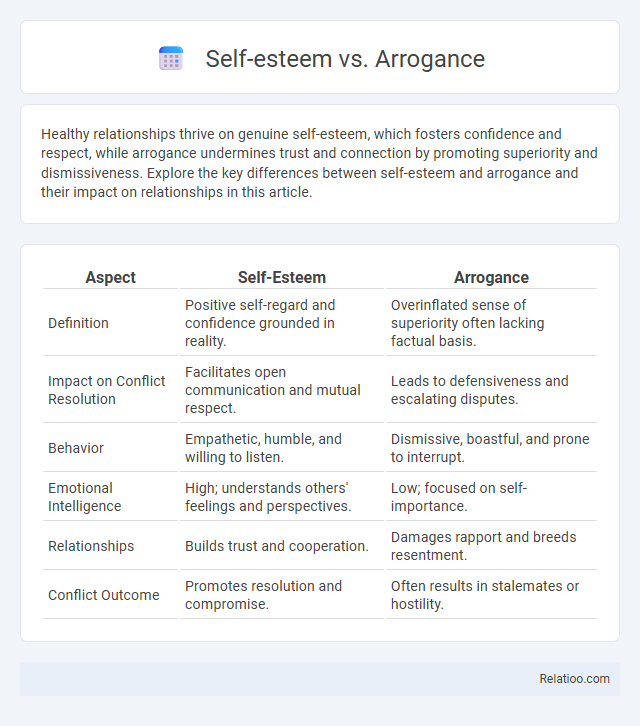Healthy relationships thrive on genuine self-esteem, which fosters confidence and respect, while arrogance undermines trust and connection by promoting superiority and dismissiveness. Explore the key differences between self-esteem and arrogance and their impact on relationships in this article.
Table of Comparison
| Aspect | Self-Esteem | Arrogance |
|---|---|---|
| Definition | Positive self-regard and confidence grounded in reality. | Overinflated sense of superiority often lacking factual basis. |
| Impact on Conflict Resolution | Facilitates open communication and mutual respect. | Leads to defensiveness and escalating disputes. |
| Behavior | Empathetic, humble, and willing to listen. | Dismissive, boastful, and prone to interrupt. |
| Emotional Intelligence | High; understands others' feelings and perspectives. | Low; focused on self-importance. |
| Relationships | Builds trust and cooperation. | Damages rapport and breeds resentment. |
| Conflict Outcome | Promotes resolution and compromise. | Often results in stalemates or hostility. |
Understanding Self-Esteem: Core Foundations
Self-esteem is grounded in an accurate and appreciative perception of one's worth, fostering confidence without dismissing others. Arrogance arises from an inflated sense of self-importance, often masking insecurity and leading to dismissiveness or superiority over others. Understanding self-esteem involves recognizing its core foundations: self-respect, realistic self-evaluation, and the ability to maintain humility while valuing personal strengths.
What Defines Arrogance?
Arrogance is defined by an inflated sense of self-importance combined with a lack of empathy or respect for others, often manifesting as condescension or dismissiveness. Unlike healthy self-esteem, which is grounded in self-awareness and confidence without belittling others, arrogance stems from insecurity masked by overconfidence. The key differentiator is that arrogance alienates and diminishes social connections, whereas self-esteem fosters positive relationships and personal growth.
Key Differences Between Self-Esteem and Arrogance
Self-esteem reflects a realistic and positive self-view grounded in genuine self-worth, while arrogance involves an exaggerated sense of superiority often masking insecurities. Key differences include humility, with self-esteem promoting respectful confidence and arrogance fostering condescension and entitlement. Self-esteem encourages healthy relationships through empathy, whereas arrogance alienates others due to its dismissive and overbearing nature.
Signs of Healthy Self-Esteem
Healthy self-esteem is characterized by realistic self-appraisal, confidence without superiority, and resilience to criticism. Unlike arrogance, which involves inflated self-importance and dismissiveness toward others, healthy self-esteem promotes empathy and constructive self-reflection. Key signs include consistent self-respect, the ability to accept mistakes, and maintaining positive relationships without feeling threatened.
Indicators of Arrogant Behavior
Arrogant behavior often manifests through exaggerated self-importance, dismissiveness toward others' opinions, and an inflated sense of superiority that overshadows genuine confidence. Unlike healthy self-esteem, which involves realistic self-respect and empathy, arrogance tends to create barriers in personal and professional relationships by prioritizing arrogance over collaboration. Recognizing these indicators can help Your awareness in distinguishing between self-assurance and detrimental arrogance, promoting healthier social interactions.
Effects of Self-Esteem on Personal Growth
Healthy self-esteem fosters resilience, confidence, and a positive mindset that fuels your personal growth by enabling you to embrace challenges and learn from failures. Unlike arrogance, which often isolates and hinders meaningful relationships, genuine self-esteem promotes empathy, openness, and self-awareness essential for continuous improvement. Cultivating balanced self-esteem empowers you to set realistic goals, maintain motivation, and build stronger connections that drive long-term success.
The Impact of Arrogance on Relationships
Arrogance can significantly damage relationships by fostering resentment, mistrust, and communication barriers, whereas healthy self-esteem promotes empathy, respect, and mutual understanding. Arrogant behavior often leads to an inflated sense of superiority that alienates friends, family, and colleagues, creating emotional distance and conflict. Building genuine self-esteem involves confidence without dismissiveness, which strengthens social bonds and encourages positive interactions.
Building Self-Esteem Without Crossing Into Arrogance
Building self-esteem involves nurturing a realistic and positive self-view based on your true abilities and values, fostering confidence without overestimating your worth. Arrogance, however, arises from an inflated sense of superiority and often alienates others, hindering genuine personal growth and relationships. Focus on self-awareness, humility, and constructive feedback to enhance your self-esteem while avoiding the pitfalls of arrogance.
Overcoming Arrogance for Personal Development
Overcoming arrogance is essential for fostering genuine self-esteem, which is rooted in self-awareness and humility rather than inflated ego. Your personal development thrives when you replace arrogance with confidence built on recognizing your true worth and valuing others' perspectives. Cultivating self-esteem requires consistent reflection and empathy, enabling you to grow authentically without alienating those around you.
Cultivating Balanced Confidence in Daily Life
Cultivating balanced confidence requires understanding the difference between self-esteem and arrogance; self-esteem is a healthy sense of self-worth grounded in realistic self-assessment, while arrogance often stems from an inflated ego and dismissiveness of others. Your goal should be to build authentic self-esteem by recognizing your strengths and weaknesses, practicing humility, and maintaining empathy in interpersonal interactions. Developing this balance enhances personal growth, improves relationships, and fosters a resilient mindset in daily life.

Infographic: Self-esteem vs Arrogance
 relatioo.com
relatioo.com